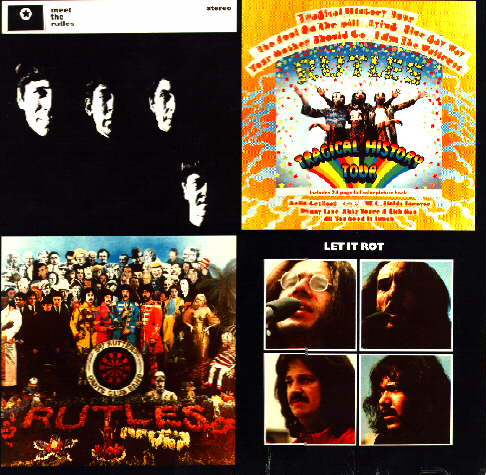Blue Öyster Cult has a lot to answer for (starting with that damn umlaut above the "O" and including enough heavy-metal black-magic imagery to embarrass even Spinal Tap). Still, it's hard to argue with an understated ode to doom and death that's as catchy as "Don't Fear the Reaper." It was impossible to escape this song in the 1970s (when every third FM DJ -- and every single overnight DJ) played it half to death (another 40,000 plays every day). (Link for Gmail subscribers.)
 But try to find a radio station that played the B-Side of "Don't Fear the Reaper" -- or a casual fan who even knows it was (for the record, it's "Tattoo Vampire").
But try to find a radio station that played the B-Side of "Don't Fear the Reaper" -- or a casual fan who even knows it was (for the record, it's "Tattoo Vampire"). Five years after not fearing the reaper for the first time, Blue Öyster Cult was back on the radio with "Burning for You," a song so slick and anonymous that it could have come from anyone. Naturally it was a huge hit and poured forth from every AM radio in America like a Vampire (tattooed or not) in search of a pre-dawn snack.
I didn't like the song much, but I loved exactly one of its lines:
Time to play B-Sides
See, I loved B-Sides. They're the vinyl equivalent of opening bands: You're there for something else (which you know you like), so you have zero expectations and anything good that comes out of it is just a lucky bonus.
Save the B-Side, save the world?
Blotto (aka the 34th Most Important Band in the World) clearly knew this. Their great 1981 single "When the Second Feature Starts" had a flip side called "The B-Side," which laments the lack of respect given to B-Sides:
The A side gets the attention
The B side? Barely a mention...
The A side has the hit
The B side ain't got...anything
My friend Eric and I once stood front and center at a Blotto concert yelling out "B-Side" until they relented and sang it. The look of confused irony on Broadway Blotto's face as he sang the chorus (including the line "And you're probably not even listening to this right now") is etched permanently on my brain.
And, of course, Buck Dharma, who wrote and sang "Don't Fear the Reaper" played the heavy-metal guitar solo on Blotto's anthemic "Metal Head." In a just world, Blotto would have been on the radio as much as Blue Öyster Cult.. and years later it would have been Blotto instead of BOC doing a cameo in the movie The Stoned Age.
Still, sometimes the B-Side was so great that it transcended B-Sidedness, like XTC's "Dear God," which started life as a non-album B-Side (on the single "Grass") until radio stations started playing it and Virgin Records made it a proper A-side (and reissued the album Skylarking, adding the song). This proves a lot of things (including that Virgin couldn't pick XTC singles to save its life), especially that it's worth taking the time to play B-Sides (link for Gmail subscribers):
 If the band is the
If the band is the 
 For more than 100 years, it was the home of McCallum's Department store, an upscale multi-level building with gorgeous wood, a huge central staircase, stained glass windows, and a community theater space on the third floor. The McCallums were a local family whose store survived the Great Depression but closed their doors for good in 1973 (oddly enough, the year Rachel Maddow was born). The building was sold, refurbished, and re-opened as "Thorne's Marketplace," a hippy-dippy mall filled with galleries, performance art spaces, and stores that sold incense, unicorn stickers, hand-crafted soaps, and funky clothing.
For more than 100 years, it was the home of McCallum's Department store, an upscale multi-level building with gorgeous wood, a huge central staircase, stained glass windows, and a community theater space on the third floor. The McCallums were a local family whose store survived the Great Depression but closed their doors for good in 1973 (oddly enough, the year Rachel Maddow was born). The building was sold, refurbished, and re-opened as "Thorne's Marketplace," a hippy-dippy mall filled with galleries, performance art spaces, and stores that sold incense, unicorn stickers, hand-crafted soaps, and funky clothing.  And then, in late 1977, a small record store took over a space on the second floor. Since Thorne's was on Main Street, it seemed a no-brainer to call the store Main Street Records. They carried the great music you thought only you knew about, the records you'd play over and over again for all your friends. The staff would talk to you about great British bands (to win you over to great music, not to make you feel small for what you didn't know) and make recommendations that were almost always spot-on. (They were even nice to my Mom when she went searching for a Christmas present for me.) Within months, Main Street Records became known as the place to go for punk and new wave records (as well as anything obscure and English). Before too long, they outgrew their space at Thorne's and moved across Main Street (and 100 yards up the block) to a storefront next to a vegan restaurant where you bussed your own tables.
And then, in late 1977, a small record store took over a space on the second floor. Since Thorne's was on Main Street, it seemed a no-brainer to call the store Main Street Records. They carried the great music you thought only you knew about, the records you'd play over and over again for all your friends. The staff would talk to you about great British bands (to win you over to great music, not to make you feel small for what you didn't know) and make recommendations that were almost always spot-on. (They were even nice to my Mom when she went searching for a Christmas present for me.) Within months, Main Street Records became known as the place to go for punk and new wave records (as well as anything obscure and English). Before too long, they outgrew their space at Thorne's and moved across Main Street (and 100 yards up the block) to a storefront next to a vegan restaurant where you bussed your own tables.  This led to a crisis at Main Street Records. A clerk explained to me at the time that they held a staff meeting to decide what to do. Some felt it was morally wrong to even stock an incomplete album that bastardized the band's vision. Others pointed out that cash-strapped customers might prefer the American version to a more expensive double-record import, which would reward Epic's "reprehensible behavior." After a long (almost rabbinical) debate, they reached a Solomonic decision.
This led to a crisis at Main Street Records. A clerk explained to me at the time that they held a staff meeting to decide what to do. Some felt it was morally wrong to even stock an incomplete album that bastardized the band's vision. Others pointed out that cash-strapped customers might prefer the American version to a more expensive double-record import, which would reward Epic's "reprehensible behavior." After a long (almost rabbinical) debate, they reached a Solomonic decision.  Julie was cool. She had the first Clash album (the UK import, not the American version, which she said was inferior, thus winning instant punk cred with everyone she knew). She bought
Julie was cool. She had the first Clash album (the UK import, not the American version, which she said was inferior, thus winning instant punk cred with everyone she knew). She bought 





